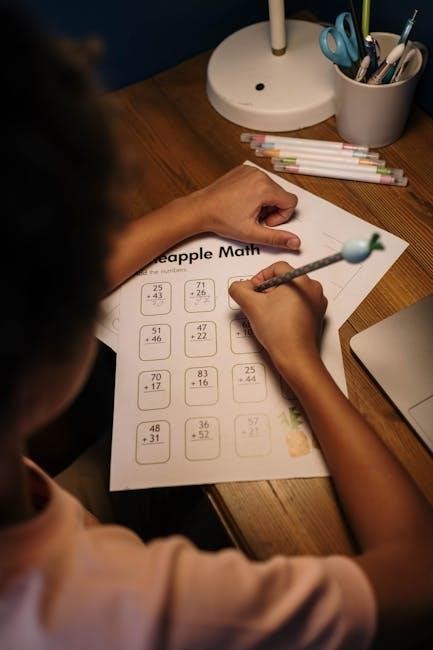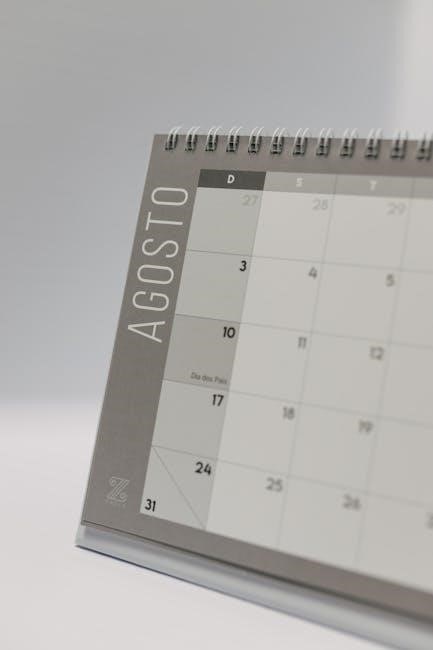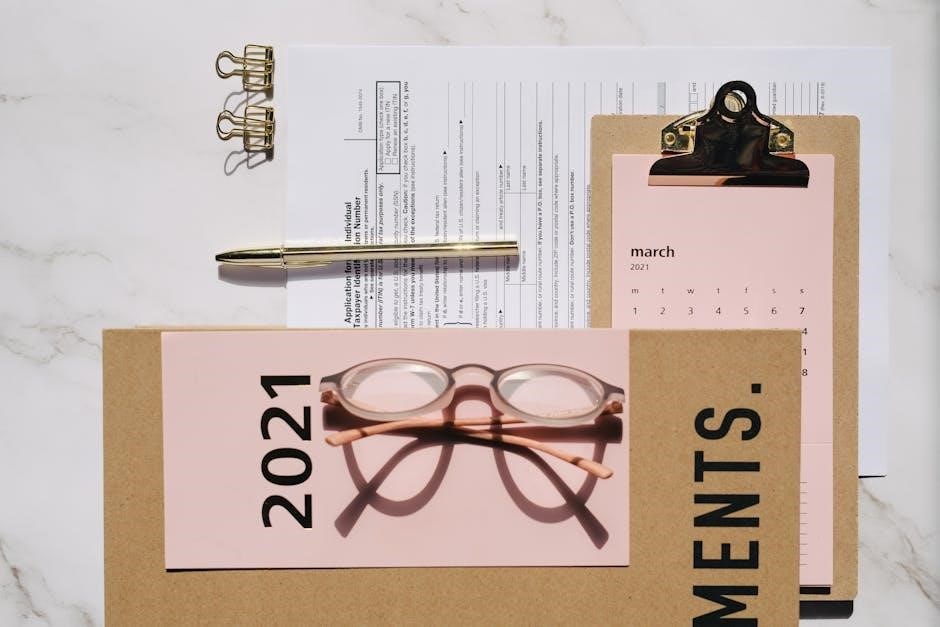
Year 3 maths worksheets PDFs are essential resources for 8-9 year olds, helping them master foundational skills like number operations, measurement, and geometry. These worksheets, available online, offer structured exercises to reinforce classroom learning and support home study. Designed to align with curriculum standards, they provide a comprehensive way to practice maths concepts, making learning engaging and accessible for all students.
Importance of Worksheets in Maths Education
Worksheets play a vital role in maths education, offering structured practice that enhances problem-solving skills and logical thinking. They provide a clear format for students to apply concepts learned in class, fostering independent learning and confidence. Regular use of worksheets helps reinforce maths fundamentals, ensuring a strong foundation for future studies. Additionally, worksheets cater to different learning paces, allowing students to revisit challenging topics and master them at their own speed. They also serve as valuable tools for identifying strengths and weaknesses, enabling targeted support. By incorporating worksheets into daily routines, educators and parents can create a consistent and effective learning environment that promotes academic success and a deeper understanding of maths concepts.
Benefits of Using PDF Worksheets for Year 3 Students
PDF worksheets offer numerous benefits for Year 3 students, providing a convenient and accessible way to practice maths skills. They are easy to download, print, and share, making them ideal for both classroom and home use. PDFs maintain consistent formatting, ensuring clarity and readability. They also allow for offline access, which is particularly useful for students without reliable internet connectivity. Additionally, PDF worksheets are often free or low-cost, making quality education resources widely available. Their portability enables students to complete tasks anytime, anywhere, promoting flexibility in learning. Moreover, PDFs can be easily saved and revisited, aiding in revision and reinforcing previously learned concepts. This versatility makes PDF worksheets a practical and effective tool for enhancing maths education in Year 3.

Key Areas of the Year 3 Maths Curriculum
Year 3 maths focuses on number, place value, addition, subtraction, multiplication, division, measurement, geometry, and fractions. These areas build foundational skills for higher-level maths concepts.
Number and Place Value
Mastering number and place value is crucial for Year 3 students, as it forms the basis of all mathematical operations. Worksheets dedicated to this area focus on understanding ones, tens, and hundreds, allowing students to read and write three-digit numbers accurately. Activities include identifying place value digits, comparing numbers, and solving problems involving different place values. These exercises help students develop a strong foundation in numeracy, essential for advanced arithmetic and real-world applications. By practicing with structured PDF worksheets, students gain confidence in manipulating numbers and understanding their composition, which is vital for future success in mathematics.

Addition and Subtraction
Addition and subtraction are fundamental skills for Year 3 students, and worksheets provide ample practice to build proficiency. These exercises focus on multi-digit sums and differences, introducing concepts like borrowing and carrying. Students engage with word problems, mental math challenges, and inverse operations to deepen their understanding. Worksheets often include visual aids like number lines and counters to support learning. By mastering these basics, students develop the confidence and accuracy needed for more complex arithmetic in the future. Regular practice with structured PDF worksheets helps reinforce these essential maths skills, ensuring a solid foundation for ongoing success.
Multiplication and Division
Multiplication and division form a critical part of Year 3 maths, and worksheets are invaluable for reinforcing these concepts. Students learn to multiply and divide two-digit numbers, exploring patterns and relationships between these operations. Worksheets often include exercises on times tables, arrays, and real-world problems to make learning engaging. Division skills are developed through sharing and grouping activities, while multiplication is introduced using visual representations like repeated addition and number lines. These resources help students build fluency and problem-solving abilities, ensuring a strong foundation for more advanced maths in later years. Regular practice with structured PDF worksheets fosters confidence and accuracy in tackling multiplication and division challenges.
Measurement (Time, Mass, Capacity)
Measurement skills are vital in Year 3 maths, and worksheets provide practical exercises for mastering time, mass, and capacity. Students learn to read analogue clocks, understand units of time, and calculate durations. Mass is explored through comparing and ordering weights using kilograms and grams, while capacity involves measuring liquids in litres and millilitres. Worksheets often include activities like matching time on clocks to digital displays and solving word problems involving measurement. These resources help students develop real-world applications of maths, such as telling time for schedules or measuring ingredients for recipes. Interactive and visually engaging PDFs make learning measurement concepts both fun and effective, ensuring students grasp these essential skills confidently.
Geometry and Shapes
Year 3 maths worksheets PDFs include engaging exercises on geometry and shapes, helping students identify and understand basic 2D and 3D shapes. Activities involve naming, sorting, and counting shapes by their properties, such as sides, angles, and vertices. Worksheets often feature colourful diagrams and interactive problems that encourage students to create patterns, complete symmetrical designs, and match shapes to real-world objects. Additionally, exercises on identifying shapes in everyday items, like circles in wheels or rectangles in books, make learning relatable. These resources are designed to enhance spatial awareness and problem-solving skills, preparing students for more complex geometry concepts in higher grades. With clear instructions and visually appealing layouts, geometry worksheets are an effective tool for fostering a strong foundation in shape recognition and manipulation.

Popular Types of Year 3 Maths Worksheets
Year 3 maths worksheets PDFs offer diverse exercises, including counting, word problems, mental maths, and time/calendar activities. These resources cater to various learning needs, ensuring comprehensive skill development through engaging and structured practice.
Counting and Basic Number Skills Worksheets
Counting and basic number skills worksheets are fundamental for Year 3 students, helping them build a strong foundation in numeracy. These exercises often include activities like numbering objects, filling in missing numbers, and sequencing. They also introduce basic addition and subtraction concepts through visual aids like counting blocks or number lines. Many worksheets focus on comparing numbers, identifying odd and even, and understanding place value. Additionally, these resources frequently incorporate word problems that involve counting and simple arithmetic, making learning engaging and practical. By practicing these skills, students develop fluency and confidence in handling numbers, which is crucial for more complex maths topics later on.
Word Problem Worksheets

Word problem worksheets are essential tools for Year 3 students to apply mathematical skills to real-life scenarios. These worksheets present problems involving addition, subtraction, multiplication, and division in contextual situations, helping students understand the practical use of maths. They often include topics like money, time, and measurement, requiring students to interpret and solve problems logically. Visual aids such as diagrams, tables, and charts are frequently incorporated to assist comprehension. Word problems also encourage critical thinking and the ability to break down complex questions into manageable steps. Regular practice with these worksheets enhances problem-solving abilities and prepares students for more advanced maths challenges. They are designed to cater to different learning paces, ensuring all students can grasp and apply maths concepts effectively.
Mental Maths Worksheets
Mental maths worksheets are designed to enhance Year 3 students’ ability to perform calculations quickly and accurately without reliance on written methods. These resources focus on developing number fluency, memory recall, and problem-solving skills. Worksheets typically include a variety of exercises, such as basic arithmetic operations, number patterns, and estimation tasks. They are often structured to simulate real-life scenarios, encouraging students to apply their maths knowledge practically. Regular practice with mental maths worksheets helps improve concentration, reduces reliance on calculators, and builds confidence in tackling maths challenges. They are also ideal for reinforcing concepts learned in class and preparing students for more complex problems in higher grades. Mental maths skills are foundational for long-term maths success and are widely encouraged in educational curricula.
Time and Calendar Worksheets
Time and calendar worksheets are tailored for Year 3 students to grasp essential concepts of units of time, days, months, and years. These resources include exercises on reading and writing times in both analogue and digital formats, understanding the sequence of days and months, and solving problems involving duration. Worksheets often feature interactive elements like matching games, fill-in-the-blanks, and sequencing activities to make learning engaging. They also cover topics such as leap years, seasons, and the number of days in different months. Regular practice with these worksheets helps students develop a strong foundation in time management and organisation, which are crucial for both academic and everyday life. By mastering these skills, students become more confident in handling time-related tasks and understanding calendar events.
Fractions and Decimals Worksheets
Fractions and decimals worksheets for Year 3 students introduce foundational concepts in a clear and engaging manner. These resources focus on understanding basic fractions like halves, quarters, and thirds, as well as introducing decimals through simple comparisons. Worksheets include activities such as identifying fractions of shapes, matching equivalent fractions, and converting between fractions and decimals. Interactive exercises like colouring, counting, and problem-solving make learning enjoyable and effective. They also incorporate real-world examples, such as measuring ingredients or dividing objects, to help students see the practical use of fractions and decimals. Regular practice with these worksheets builds a solid understanding and prepares students for more complex maths topics in the future. By mastering these skills, students gain confidence in handling fractions and decimals with accuracy and ease.

Free Resources for Year 3 Maths Worksheets PDF
Discover free Year 3 maths worksheets PDFs online, offering a variety of exercises for number skills, word problems, and mental maths. Websites like White Rose Maths and KS2 provide high-quality, downloadable resources tailored for classroom or home use. These worksheets include structured exercises and activities designed to support learning and track progress effectively.
Best Websites for Downloading Free Worksheets
Several reputable websites offer free Year 3 maths worksheets in PDF format. White Rose Maths is a top choice, providing a variety of resources aligned with the UK curriculum. KS2 Maths Worksheets is another excellent site, offering structured exercises for Year 3 students. Additionally, Teachit and Mathletics have an array of free resources available for download. BBC Bitesize and MyMaths are also great platforms that cater to the UK curriculum, offering downloadable PDFs. For independent educator resources, exploring forums or sharing platforms might yield additional hidden gems. Ensure the websites are trustworthy and align with educational standards before downloading.
White Rose Maths Worksheets for Year 3
White Rose Maths offers a wide range of free, high-quality worksheets tailored for Year 3 students. These resources are meticulously designed to align with the UK curriculum, ensuring comprehensive coverage of key maths topics. From number operations to measurement and geometry, the worksheets provide structured exercises to reinforce learning. Weekly lesson plans, such as “Measure Mass” and “Compare Mass,” are available in PDF format, making them easy to download and use. Additionally, White Rose Maths includes answer keys for selected worksheets, aiding in self-assessment and progress tracking. These resources are ideal for both classroom use and home learning, supporting parents and teachers in creating a structured learning environment. The clarity and relevance of these worksheets make them a trusted choice for Year 3 maths education.
KS2 Maths Worksheets for Year 3 Students
KS2 maths worksheets are tailored to Year 3 students, providing a comprehensive approach to learning key maths skills. These resources are designed to meet the UK curriculum requirements, focusing on areas such as number operations, measurement, and geometry. Available in PDF format, they offer a variety of exercises that cater to different learning styles. Many worksheets include activities like counting, basic number skills, and word problems, helping students build a strong foundation in maths. Additionally, they often feature topics like time and calendars, fractions, and mental maths, ensuring a well-rounded education. KS2 maths worksheets are ideal for both classroom and home use, making them a valuable tool for teachers and parents alike.

How to Use Year 3 Maths Worksheets Effectively
Year 3 maths worksheets are effective tools for structured learning. Create a tailored plan, linking exercises to curriculum goals. Incorporate them into daily routines for consistent practice and use them for homework to reinforce concepts and consolidate understanding.
Creating a Structured Learning Plan
Creating a structured learning plan with Year 3 maths worksheets PDFs helps students stay focused and track progress. Begin by identifying key areas of the curriculum, such as number operations, measurement, and geometry. Assign specific worksheets weekly, ensuring a balance between different skills. For example, dedicate Mondays to number and place value, Wednesdays to multiplication and division, and Fridays to geometry. Regularly review completed worksheets to assess understanding and adjust the plan as needed. This structured approach ensures consistent practice and steady improvement, helping students build a strong foundation in maths.
Incorporating Worksheets into Daily Routines
Incorporating Year 3 maths worksheets PDFs into daily routines ensures consistent practice and skill development. Start by dedicating 15-20 minutes daily to worksheet activities, either in the morning or after school. Mix different types of worksheets, such as mental maths, word problems, and geometry exercises, to keep learning engaging. For younger students, pair worksheets with hands-on activities to reinforce concepts. Older students can independently complete worksheets, fostering self-directed learning. Use a timer for timed exercises to improve speed and accuracy. Rotate topics weekly to cover all areas of the curriculum, ensuring well-rounded progress. This daily routine helps build confidence and a strong maths foundation, making learning enjoyable and effective.

Using Worksheets for Homework and Revision
Year 3 maths worksheets PDFs are invaluable for homework and revision, providing structured practice outside the classroom. Assign specific worksheets that align with current topics to reinforce learning. For homework, select worksheets that focus on areas where students need extra practice, ensuring targeted improvement. During revision, use mixed-topic worksheets to assess understanding and identify gaps. Parents and teachers can easily track progress by reviewing completed sheets, offering feedback to guide further study. Worksheets also serve as excellent tools for exam preparation, helping students familiarize with question formats and build confidence. Regular use of these resources ensures consistent revision and strengthens maths skills effectively, making them a key part of a successful learning strategy.

Assessment and Progress Tracking
Year 3 maths worksheets PDFs are vital for assessing student progress, identifying strengths and weaknesses, and supporting structured learning to achieve maths goals effectively.
Using Worksheets to Identify Strengths and Weaknesses
Year 3 maths worksheets PDFs serve as valuable tools for assessing student performance and pinpointing areas of strength and improvement. By analyzing results from these exercises, teachers and parents can identify where a child excels, such as in multiplication or geometry, and where additional support is needed, like in word problems or measurement. Regular use of these worksheets reveals patterns in learning, enabling targeted interventions. For instance, consistent accuracy in number operations may highlight a strong foundation, while repeated errors in fractions could signal a need for extra practice. This data-driven approach ensures personalized learning plans, fostering academic growth and confidence in maths skills.
Setting Achievable Goals with Worksheets
Year 3 maths worksheets PDFs are instrumental in setting realistic and achievable goals for students. By breaking down the curriculum into manageable sections, these resources allow learners to focus on specific skills, such as mastering multiplication tables or improving time-telling abilities. Parents and educators can use worksheets to track progress, celebrating small victories and adjusting objectives as needed. For example, a student struggling with addition can start with basic sums and gradually move to more complex problems. This incremental approach builds confidence and ensures steady improvement. Worksheets also provide a clear roadmap, helping students stay motivated and directed as they work towards long-term maths proficiency. Regular goal-setting with these tools fosters a growth mindset, equipping children with the resilience to tackle challenges effectively.

Year 3 maths worksheets PDFs are a valuable tool for skill mastery, confidence building, and fostering a lifelong love for learning. They provide structured, accessible resources for teachers and parents, ensuring consistent practice and progress. By leveraging these worksheets, students can solidify their maths foundation, preparing them for future academic success. Effective use of these resources creates a strong, enjoyable learning experience that nurtures curiosity and achievement in mathematics.
The Role of Worksheets in Year 3 Maths Success
Worksheets play a pivotal role in Year 3 maths success by providing structured, engaging, and targeted practice. They help students master essential skills such as number operations, measurement, and geometry through clear, curriculum-aligned exercises. Regular use of worksheets builds confidence, fluency, and problem-solving abilities, ensuring a strong foundation for future maths learning. Additionally, worksheets allow teachers and parents to identify areas where students may need extra support, enabling personalized learning. Their versatility makes them ideal for classroom activities, homework, or revision, catering to different learning styles and preferences. By incorporating worksheets into daily routines, students develop a consistent and effective study habit that fosters academic achievement and a positive attitude toward maths.
Encouraging a Love for Learning with Worksheets
Worksheets are a powerful tool for fostering a love for learning in Year 3 students. By presenting maths in an engaging and interactive way, they make complex concepts fun and accessible. Colourful designs, puzzles, and real-world applications capture students’ interest, turning maths into an enjoyable activity rather than a chore. Worksheets also allow children to work at their own pace, building confidence and independence. The sense of achievement they gain from completing exercises fuels a desire to learn more. This positive association with maths helps students develop a lifelong love for learning, laying the groundwork for future academic success and a curiosity-driven mindset.
